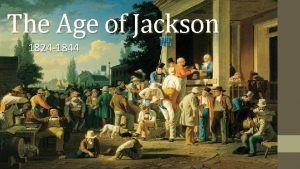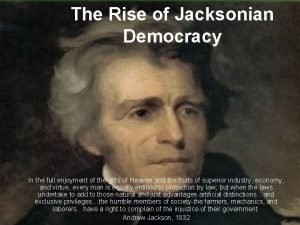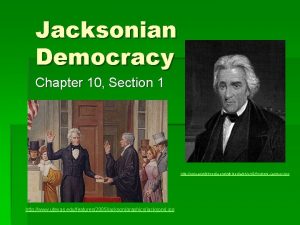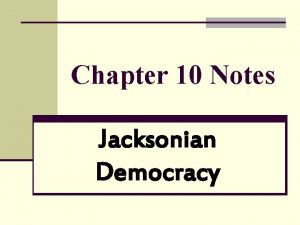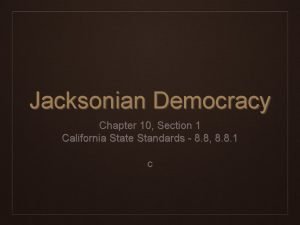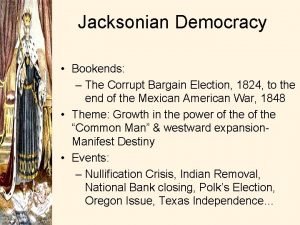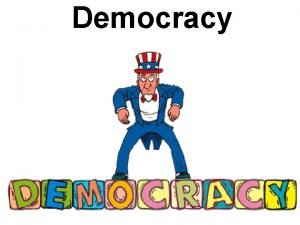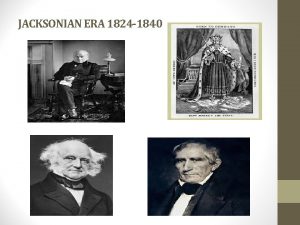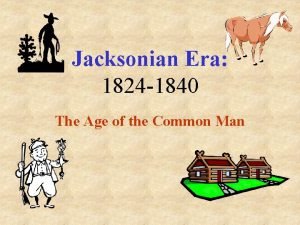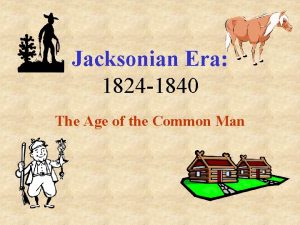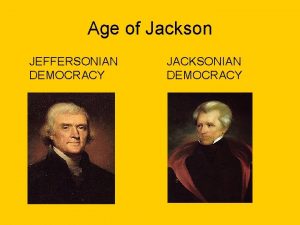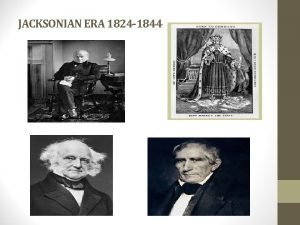The Age of Jackson 1824 1840 Jacksonian Democracy












- Slides: 12

The Age of Jackson 1824 -1840

Jacksonian Democracy Politics of the Common Man l Universal male suffrage l Improved education l State suffrage laws (no religious or property clauses) l Party nominating conventions l No nominations by “King Caucus” l Popular elections of electoral college l SC was the only state to have legislature choose l Two Party system l Large political parties are needed to campaign to the electorate l Spoils System l The giving of government jobs to political supporters l Jackson was a strong supporter of this system

The Election of 1824 l l l l This election ends the “Era of Good Feelings” Jackson, Adams, and Clay all split electoral votes The election was thrown to the House of Reps. Clay used his influence to swing votes to Adams in return for a Cabinet position (Sec. of State. ) Jackson supporters referred to this as the “corrupt bargain. ” This fueled the creation of a second political Party, lead by Jackson’s party began to campaign immediately for 1828. They championed the rights of the common man against the “corrupt bargainers” who were stealing democracy in the opinion of the Jacksonians.

The “Revolution of 1828” l l l The new idea of party organization and the discontent of the Southerners (Tariff of 1828) swept Jackson into office. Three times the number of voters participated in 1828 as compared to 1824. Jackson greatly expanded the role of President, while at the same time narrowing the scope of federal government, this was evidenced by his use of the veto 12 times, more than the 6 previous Presidents

Jackson and the Indians l Jackson’s democracy was not extended to Native Americans. l He was openly hostile to them, as he had been in the military l In 1830 he signed the Indian Removal Act that sent Native Americans West of the Mississippi to live on reservations l He also defied the Supreme Court ruling in Worcester v. Georgia

Video Clip

The Nullification Crisis l l l Although Jackson was a states’ rights supporter, he was also a Unionist The Webster-Hayne debate fueled the sectional and nullification crisis, Jackson declared, “The Union, it must be preserved. ” The Nullification Crisis exploded over the Tariff of 1828, a large tariff on imports SC held a secession convention and passed a resolution not to collect the tariff. Jackson threatened to send troops. A compromise was reached when the tariff was lowered and SC disbanded the convention

Video Clip

The Bank Veto l l l Jackson demonstrated his loathing of central government through the veto of the bank He felt the bank was a tool of the Eastern elite and served only the interest of the wealthy The veto was a popular measure and propelled Jackson to re-election with a 3/4 ths majority of electoral votes.

Jackson’s Second Term l l Jackson’s second term was unremarkable, except to note it failures His veto of the bank recharter forced him to deposit federal monies in state banks, referred to as “pet banks” These banks were able to profit greatly from the additional funds made available for loans. Speculation in Western lands also created problems for Jackson l As land speculators inflated prices and devalued currency, Jackson issued the Specie Circular l This stated that all federal land had to be purchased with hard currency, gold or silver l This circular had the effect of making bank notes lose even more value l The result was a loss of consumer demand the Panic of 1837 a severe depression

Video Clip

Jacksonian Democracy in Perspective l l l Jackson helped to develop the 2 party system His methods of campaigning were important to help bring democracy to the common man. By the election of 1840, an unbelievable 78% of eligible voters turned out for the election. This is testament to the democratic forces unleashed by Jackson and his supporters His record as a politician is less democratic, with the Indian Removal Act, defying the Supreme Court, and the threat of military action against South Carolina Jackson was an interesting dichotomy
 Guided reading & analysis: the age of jackson, 1824-1844
Guided reading & analysis: the age of jackson, 1824-1844 The age of jackson 1824-1844
The age of jackson 1824-1844 Jacksonian democracy
Jacksonian democracy Lesson 1 jacksonian democracy
Lesson 1 jacksonian democracy Chapter 10 section 1 jacksonian democracy
Chapter 10 section 1 jacksonian democracy What is jacksonian democracy? *
What is jacksonian democracy? * Chapter 10 section 1 jacksonian democracy
Chapter 10 section 1 jacksonian democracy What is the jacksonian democracy
What is the jacksonian democracy Jacksonian democracy
Jacksonian democracy Traditional democracy
Traditional democracy Romantic period 1798 to 1832
Romantic period 1798 to 1832 The romantic age (1798 to 1824)
The romantic age (1798 to 1824) Iron age bronze age stone age timeline
Iron age bronze age stone age timeline
